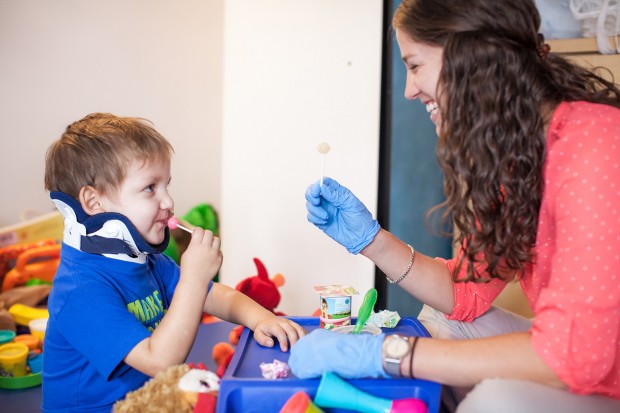How a Speech Pathologist Works with Schools to Improve Student Outcomes
How a Speech Pathologist Works with Schools to Improve Student Outcomes
Blog Article
Exactly How a Speech Pathologist Can Assist Improve Communication Skills
Efficient communication is a cornerstone of professional and personal success, yet several individuals face challenges that prevent their capacity to share themselves plainly. A speech pathologist is furnished to address these barriers via targeted analysis and intervention techniques tailored per person's requirements. By employing evidence-based therapeutic techniques, they not just function to enhance speech and language disorders yet likewise improve overall communicative capability. Recognizing the diverse role of a speech pathologist discloses just how their know-how can transform lives, inviting a more detailed assessment of the particular methods and end results connected with their practice.
Recognizing Communication Problems
Understanding interaction disorders is essential for identifying how they affect people' capability to share themselves and engage with others. Interaction problems include a wide variety of problems that influence speech, language, and social interaction, commonly impeding reliable interaction. These problems can occur from numerous factors, including neurological problems, developmental hold-ups, physical impairments, or psychological problems.
Speech problems might manifest as problems in fluency, voice, or expression manufacturing, influencing exactly how words are pronounced or talked. Language problems, on the other hand, involve difficulties in understanding or utilizing language, which can hamper both non-verbal and spoken interaction. Social interaction disorders are characterized by problems in the pragmatic elements of communication, such as taking kip down discussion or understanding social signs.
The consequences of communication disorders are profound, impacting not only the individual's ability to convey feelings and ideas yet additionally their social relationships, educational opportunities, and total top quality of life. Recognition of these problems can promote empathy and support, encouraging effective strategies for interaction and involvement. Recognizing the intricacies of communication problems is an essential step in the direction of advertising inclusivity and resolving the demands of those impacted.
Function of a Speech Pathologist
Speech pathologists frequently play a vital function in identifying and treating communication disorders, using a variety of evidence-based methods customized per person's requirements. These specialists deal with individuals throughout the life expectancy, from kids with speech delays to adults recuperating from strokes or stressful brain injuries. Their expertise incorporates a range of communication issues, including expression, language, voice, and fluency problems.
In restorative settings, speech pathologists use structured treatments designed to boost communication abilities. They might carry out techniques such as speech workouts, language games, and social interaction training to facilitate enhancements in responsive and meaningful language capabilities. Speech Pathologist. In addition, they inform customers and their families regarding reliable communication methods and flexible approaches to browse daily interactions
Beyond direct therapy, speech pathologists work together with other medical care instructors, specialists, and caregivers to make sure an extensive technique to therapy. They support for clients by offering resources and assistance, making it possible for people to achieve their communication goals and enhance their general top quality of life. As specialists in the area, speech pathologists are vital in promoting efficient interaction, advertising freedom, and boosting social participation for those with communication challenges.
Assessment and Diagnosis Process
The assessment and medical diagnosis procedure conducted by speech pathologists generally involves an extensive evaluation to identify communication problems properly. This procedure starts with a detailed case background, where the medical professional collects significant details regarding the individual's medical, educational, and developmental history. Recognizing the context of the person's communication difficulties is important for an accurate medical diagnosis.
Adhering to the situation history, speech pathologists utilize standard examinations and informal assessments to review different elements of communication, consisting of speech noise production, language understanding, meaningful language, and social communication abilities. These evaluations are tailored to the person's age and details worries, browse around this site providing beneficial information for analysis.
Monitoring is likewise an important element of the assessment procedure, as it enables the medical professional to see firsthand how the private communicates in all-natural settings. In addition, interviews with relative and educators can offer understanding into the person's communication difficulties across various environments.
When the assessment is complete, the speech pathologist synthesizes the searchings for to determine a diagnosis and suggest proper interventions. This complete evaluation procedure makes sure that people get targeted assistance customized to their distinct interaction demands, laying the foundation for efficient therapeutic techniques.
Healing Techniques and Methods
Countless therapeutic methods and methods are employed by speech pathologists to deal with a range of interaction disorders efficiently. One commonly made use of approach is articulation therapy, which focuses on remedying speech appears with rep and aesthetic signs. This technique is particularly helpful for people with speech audio problems.
Another reliable strategy is language intervention, which improves both expressive and receptive language skills. This may include interactive activities that promote vocabulary advancement, syntax understanding, and conversational skills. Additionally, speech pathologists typically utilize social skills training to enhance pragmatic language capabilities, allowing individuals to navigate social interactions much more successfully.
Fluency shaping and stuttering modification techniques are especially developed to assist those experiencing fluency disorders. These approaches help customers create smoother speech patterns and handle the emotional and physical components of stuttering.
Moreover, augmentative and alternative interaction (AAC) systems are utilized for individuals with severe interaction disabilities. These systems, which can include motions, signs, or electronic devices, give necessary support for effective interaction.
Benefits of Speech Therapy

In addition, speech treatment can help in developing vital listening and understanding abilities, fostering better communication in conversations. Individuals reference with cognitive-communication conditions can also profit, as treatment focuses on reinforcing memory and analytic capabilities, important for reliable interaction.
Another critical aspect is the psychological support provided during therapy sessions. Speech pathologists develop a safe setting, encouraging patients to get rid of anxiety and stress pertaining to their communication problems. This support can cause improved self-worth and overall psychological well-being.
In addition, early intervention via speech therapy can protect against additional complications, making sure that individuals reach their complete communicative possibility. In general, the advantages of speech therapy prolong beyond plain speech improvement, favorably influencing different measurements of life for those affected by communication troubles.
Conclusion
In summary, speech pathologists play a critical role in addressing communication problems through assessment, medical diagnosis, and customized therapeutic interventions. By utilizing evidence-based strategies, these professionals improve people' speech and language capabilities, promoting boosted clarity, fluency, and social interaction skills. The benefits of early treatment emphasize the importance of seeking support from speech pathologists, as their proficiency can dramatically enhance communicative capacity, eventually causing better success in both professional and personal spheres.

Speech pathologists frequently play a crucial duty in diagnosing and treating communication disorders, using a range of evidence-based methods customized to each person's needs. advice As professionals in the field, speech pathologists are crucial in fostering effective communication, advertising freedom, and boosting social participation for those with communication obstacles.

Report this page